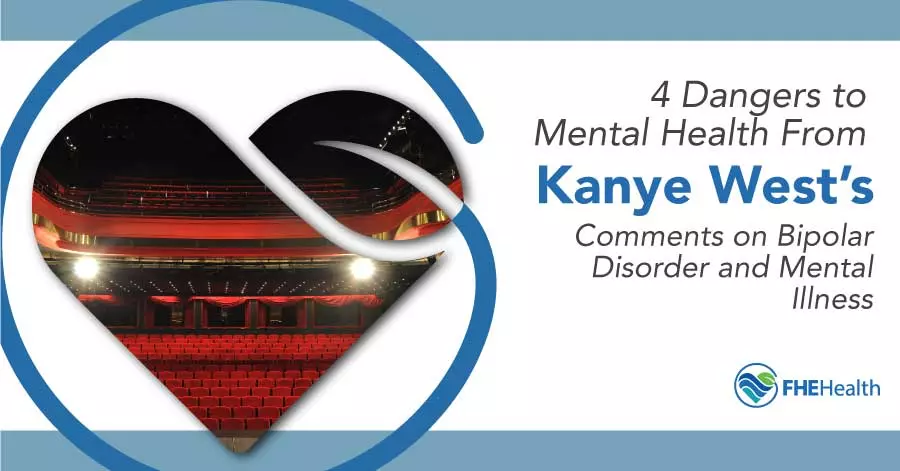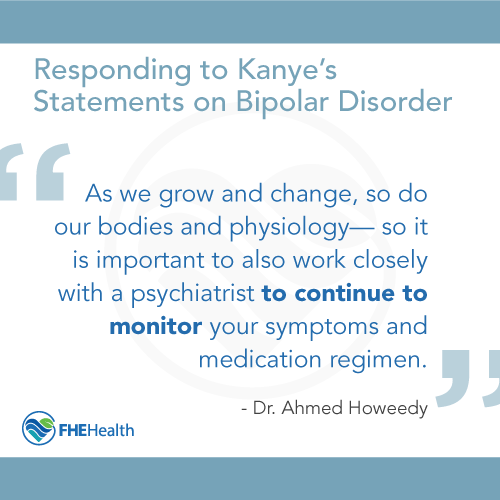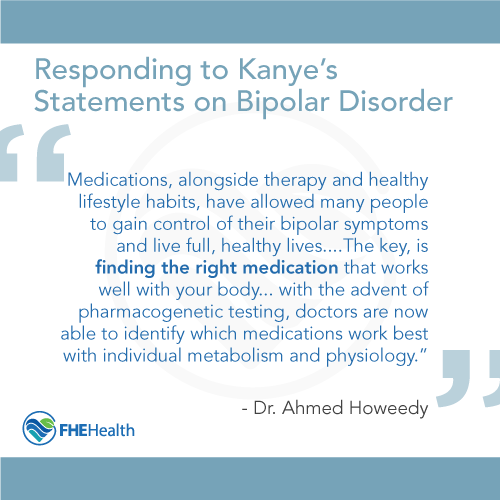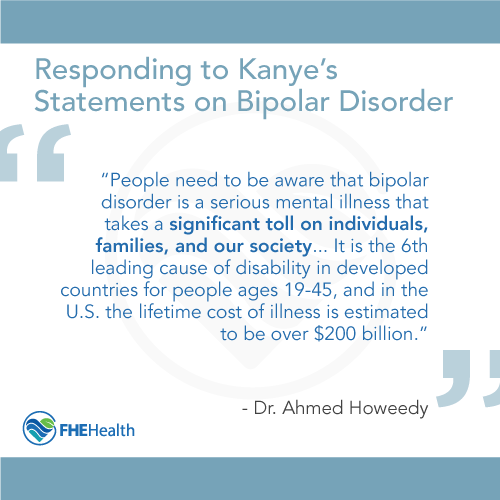
Updated February 21, 2022
Since the airing of this blog in June 2019, rapper Kanye West and his open struggles with bipolar disorder have been in the news yet again and a source of celebrity gossip and public speculation. West has been adamant that he does not need medication to manage his symptoms. He also has complained that medical treatments for bipolar disorder like lithium, which has helped many people with the condition live healthy, stable lives, blunt his emotions and creativity.
Bipolar Disorder Should Be Taken Seriously
Now, new revelations about the rapper and his own public comments have generated concern in some corners that he may be in a manic episode or experiencing untreated symptoms of bipolar disorder. His dramatic split with celebrity Kim Kardashian, erratic Instagram posts attacking Kardashian and comedian Pete Davidson, and the grandiose self-proclamations in his recent Netflix documentary are some of the signs that his condition should be taken seriously.
Untreated bipolar disorder can be life-threatening. On the other hand, the condition can often be treated effectively with medication and psychotherapy. Many people, including gifted creatives like West, have found relief from the destabilizing highs and lows of the disorder by taking mood-stabilizing drugs like lithium or lamotrigine. These medications, whether alone or in combination with antipsychotics or other medications, are proven to reduce symptoms and save lives.
For more in-depth treatment of West’s comments on mental illness, check out the below critique of his interview with David Letterman, in Season 2 of the show My Guest Needs No Introduction with David Letterman. The conversation with Letterman touched on a wide range of topics, from the death of West’s mother, a Fulbright scholar and English professor … to echoes of West’s controversial views aired elsewhere (about Trump, the “Me Too” movement, slavery, etc.) … to his high-end clothing line … to his weekly “Sunday Service” gatherings, an eclectic blend of improvisational lyrics and “healing sounds” saturated in an otherworldly glow of red-colored ambience, to which West attributed being “more calm, more in the moment, more stable.”
Medications Do Improve Mental Health for People with Depression and Bipolar Disorder
Earlier in the interview, it became clear what sort of healing West was seeking when he shared some of his experience with bipolar disorder. It was the highlight of the whole interview, a touching and vulnerable moment exchanged between two people who had, in different ways, dealt with mental health conditions that medication had helped.
In Letterman’s case: years of denial over untreated depression that finally led to acceptance and a doctor’s prescription for an “SSRI” antidepressant.
“It was like getting a new pair of glasses,” Letterman said. The audience applauded.
West, describing how medication had helped him manage the manic symptoms that define bipolar disorder, said: “If you don’t take medication every day to keep you at a certain state, you have a potential to ramp up and it can take you to a point where you can even end up in the hospital. And you start acting erratic, as TMZ would put it.” (West was referring to his appearance on TMZ where he was recorded as saying that slavery was a “choice.”)
By “ramping up,” West was referring to the manic episodes in which we would “go high.” He went on to liken these episodes to having a “sprained brain”: “You’re hyper-paranoid … Everything’s a conspiracy … You feel everyone wants to kill you.”
Not Taking Medication for Bipolar Disorder?
Whereas Letterman praised “modern medicine” based on his own experience with an antidepressant, West took a different tack entirely, first announcing that for eight months he had been off his medication, and then lauding “primitive”—or “alternative,” according to Letterman’s translation—treatments.
West quickly qualified his choice (to stop taking medication) as one he would not recommend to people with other diagnoses such as schizophrenia.
At one point, humorously affirming Letterman for finding a med that worked for him, West quipped, “You obviously didn’t have a medication that made you fat.” He continued: “We can go and find things that are silver bullets … I’m sure you got the thing that had as few side effects as possible.”
How West Both Helped and Hindered the Cause for Treating Bipolar Disorder and Other Mental Illnesses
Because of West’s huge following, his remarks about mental health have the potential to exert a profound influence on people with mental health challenges— both for the better and for the worse. On the one hand, the fact that West was willing to be vulnerable about his struggles with mental illness took great courage and will go far to reduce the stigma of mental illness. On the other hand, West’s comments posed at least four dangers to public mental health:
Public Health Danger #1: You don’t need medication for bipolar disorder
 When West announced he had been off medication for eight months and the audience applauded, he may have done a disservice to the roughly three percent of Americans with bipolar disorder who may now be led to believe they don’t need medication to manage their condition.
When West announced he had been off medication for eight months and the audience applauded, he may have done a disservice to the roughly three percent of Americans with bipolar disorder who may now be led to believe they don’t need medication to manage their condition.
Bipolar disorder is a chronic disease characterized by extreme highs and lows that are debilitating and can result in suicide. However, long-term medication management for the condition has proven to significantly reduce these dramatic and uncontrollable shifts in mood, thereby reducing the chances of relapse. People with bipolar disorder who do not take medication to control their condition are taking a gamble: they are putting themselves at greater risk of a relapse, which worsens with each occurrence— so they’re actually risking their life by not taking their medication.
FHE Health Chief Medical Office Dr. Ahmed Howeedy cited another reason people with bipolar disorder need continued medication maintenance and monitoring by a doctor: “As we grow and change, so do our bodies and physiology— so it is important to also work closely with a psychiatrist to continue to monitor your symptoms and medication regimen.”
Public Health Danger #2: “Primitive”/alternative treatments for mental illness are just as effective as those from modern meditcine
When West lauded “primitive” treatments—for example, he touted “light healing”—as being on a par in their effectiveness with modern medicine, he may have sent at least some people down a risky rabbit hole looking for holistic treatments for whatever mental health problem ails them.
In reality, many such “primitive” or “alternative” (by Letterman’s translation) treatments have not received the same level of rigorous scientific scrutiny and testing as the medications we have today for bipolar disorder. For example, for more than 60 years the medication lithium (as one of a number of medication options) has successfully treated many people with bipolar disorder, giving many of them their lives back when they could have died to suicide at a much younger age. The efficacy of lithium has been supported by many, many studies worldwide.
Public Health Danger #3: The side effects of medications for bipolar disorder outweigh the benefits.
 When West complained about the side effects of medications for bipolar medication, he may have contributed to the misunderstanding that the side effects of taking medications for bipolar disorder far outweigh the benefits.
When West complained about the side effects of medications for bipolar medication, he may have contributed to the misunderstanding that the side effects of taking medications for bipolar disorder far outweigh the benefits.
He was right about one thing: medications can have unpleasant side effects like weight gain— but so do natural herbal supplements or vitamins, according to Dr. Howeedy. He said, “When we look at the significant impact that bipolar disorder can have on a person’s physical and mental wellbeing, we find that in fact, the benefits of medications outweigh the possible side effects.”
Dr. Howeedy added that “medications, alongside therapy and healthy lifestyle habits, have allowed many people to gain control of their bipolar symptoms and live full, healthy lives.” “The key,” he said, “is finding the right medication that works well with your body,” noting that “with the advent of pharmacogenetic testing, doctors are now able to identify which medications work best with individual metabolism and physiology.”
How one person responds to a medication will, therefore, be different from how another person responds to it; and, thanks to advances in modern medicine, people with bipolar disorder and other conditions have more than one medication option to choose from. With time, patience, a willingness to be flexible, and a good doctor, you can find a medication that you tolerate and that successfully addresses your symptoms— so that your condition doesn’t have to stop you from living a happy and productive life.
Public Health Danger #4: Bipolar disorder is not a serious mental disorder.
 When West differentiated between his condition, which by his interpretation doesn’t require medication to manage, and schizophrenia, a much more serious condition by West’s implication, he may have also fostered the misconception that bipolar disorder is not a serious mental illness. Nothing could be further from the truth:
When West differentiated between his condition, which by his interpretation doesn’t require medication to manage, and schizophrenia, a much more serious condition by West’s implication, he may have also fostered the misconception that bipolar disorder is not a serious mental illness. Nothing could be further from the truth:
- Research has revealed that the mortality rate for bipolar disorder triples that for the general population.
- People with bipolar disorder suffer from a higher rate of serious, co-occurring health issues.
- 25-50 percent of people with bipolar disorder will reportedly attempt suicide at least once. Often, people with the disorder will make more than one attempt.
- The disease also has “one of the highest rates of co-occurring substance use when compared to other mental illnesses.”
“People need to be aware that bipolar disorder is a serious mental illness that takes a significant toll on individuals, families, and our society,” Dr. Howeedy said. “It is the 6th leading cause of disability in developed countries for people ages 19-45, and in the U.S. the lifetime cost of illness is estimated to be over $200 billion.”
Dr. Howeedy also noted that the condition often goes undiagnosed or is misdiagnosed, so “it is important for people to be aware of the condition, as many people may be suffering without getting the proper treatment to help them live healthy, satisfying, productive lives.”
If you suffer from bipolar disorder or any other mental illness, there has never been a better time to get treatment. With experts who understand your disease and know what you’re going through, you’ll be able to find the right medication that works best for you. You’ll also discover tools for healthy living that can help you successfully manage your condition. Call us today, so that you can get back to the business of living life.






